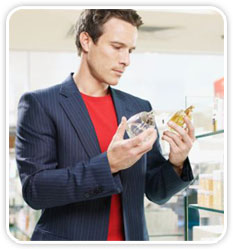Perfume is a mixture that contains aromatic essential oils, alcohol and a fixative, used to provide a pleasant and long-lasting aroma to different objects, but mainly to the human body.
Essential oils are organic substances, liquid but sometimes solid, with a pungent, irritating and even caustic odor and taste. They can be distilled without decomposition, they are not miscible in water but they are soluble in alcohol and ether. They do not have the greasy and unctuous touch of fixed oils and do not give soap. They dissolve fatty substances, wax and resins.
Its chemical composition is extremely varied; they often contain hydrocarbons of formula C10H16 or a multiple or submultiple and an oxygenate or camphor. Some contain ethers, alcohols, phenols; others contain sulfur. They exist in all the organs of the plants but especially in the leaves and in the flowers.
Most of the essences already exist fully formed in the plant or vegetable; However, others do not pre-exist but are formed by the action of water on certain parts of the plant by which action certain elements found in the cells are combined and determine the formation of the essence.
Fixatives that bind the various fragrances include balms, ambergris, and glandular secretions from genets and musk deer (these undiluted secretions have an unpleasant odor, but in alcoholic solution they act as preservatives). These animals are now protected in many countries, which is why perfume manufacturers use synthetic musk.
The amount of alcohol depends on the type of preparation to which it is directed. Normally, the mixture is aged for one year.
Types of perfume
The quality of a perfume is determined by the amount of essence used in the formula of its elaboration. Thus, we can speak of an extract when the essence concentration reaches 40% in relation to the amount of alcohol. This formula, the most expensive of all, comes in the form of a cream. But, without a doubt, the liquid forms of perfume are the best known and most used.
- UAE OF PARFUM. The highest concentration of fragrance presented in liquid format. It normally contains between 15-40% active ingredients, essential or fragrant oils. Its fragrance lasts up to 7 hours.
- EAU DE TOILETTE. It has more or less 10% essential oils. Its odor in the body remains between 3 and 5 hours.
- UAE OF COLOGNE. Includes approximately 5% essence. Its aroma lasts approximately 3 hours in the body.
- COLONY. It is a very light form of perfume, with only 2-3% concentration. It is the most used by those who like to apply fragrances generously, but it does not last more than two hours on the body.
RECOMMENDATIONS FOR USE
- Light and heat can alter the formula of a fragrance. Do not expose the bottles to the sun or near a heat source. Nor should they be kept for long. A good option for their conservation is to keep them in the refrigerator.
- The climate influences the evaporation of the perfume. The heat facilitates its evaporation, so it is necessary to moderate the application of perfume in summer. The vasoconstrictor effect of cold, on the contrary, causes the olfactory notes to expand more slowly.
- A perfume smells different in each person, hence the importance of trying them before acquiring them. The aroma that an essence gives off on a person's skin depends on their diet, skin type and lifestyle.
- A perfume should be tried on the wrist and the bend of the elbow. You have to wait 15 minutes for the final smell of each skin to return.
- To perfume with long-lasting effects, it is best to do it on the neck, wrists, nape and hamstrings. A widely used trick is to put a cotton swab soaked in perfume around the neckline and lightly spray the clothes with a spray bottle.
- Perfumes should not be abused in any of their presentations: although the wearer does not detect the fragrance, it is still there and others do. More quantity does not mean longer duration.
- Dry skin needs more fragrance. If the diet is low in fat, the perfume lasts less time. In people who smoke, the duration of a perfume is shorter and, in addition, its aroma can change.
- The scent of scented soaps, gels, creams or lotions can change the scent of the perfume. It is preferable to purchase these products from the same perfume line or, failing that, without aroma.
Wikipedia and Consumer
